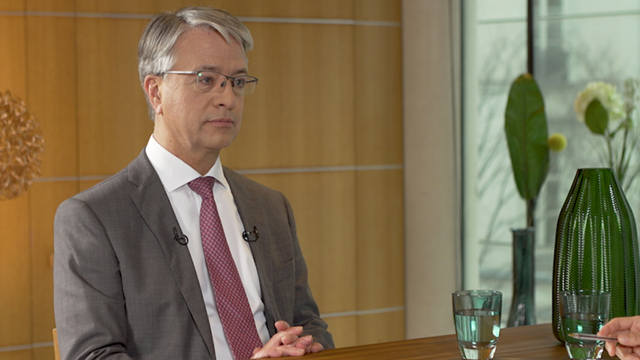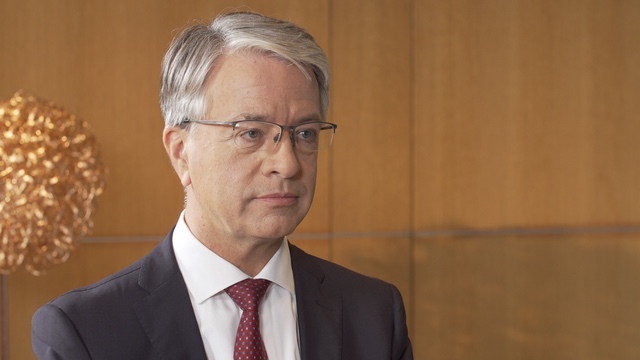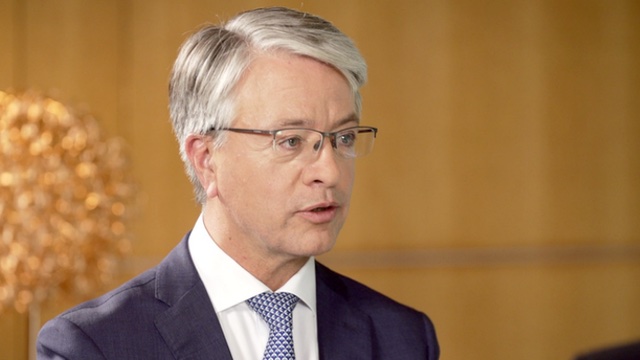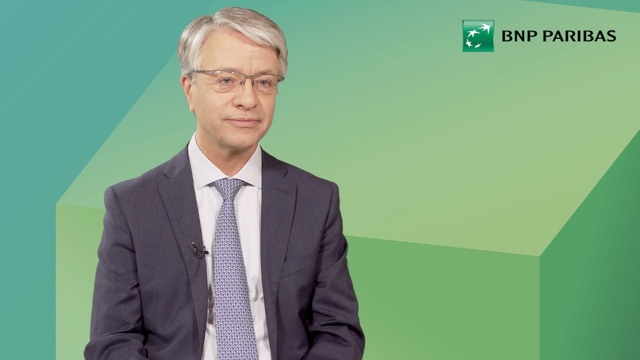EuroBusiness Media (EBM): BNP Paribas, one of Europe’s largest banks, just reported profit for the first quarter of 2008, Baudouin Prot welcome, you are the CEO of BNP Paribas, before looking in more detail at your different business lines, what is your overall update today on the bank's general performance in the first-quarter?
Baudouin Prot (BP) Well, I think the first thing is that BNP Paribas generated close to €2bn net income this quarter, which represents a substantial achievement given market conditions. Each division made a positive contribution to that figure, including CIB, in clear contrast with what we have seen from other major players and other CIB players. Group revenues are down 10% compared to their record level in the first quarter of 2007, mainly as a result of fair value adjustments directly related the crisis (360 million euros), and an exceptionally harsh market conditions in March. The crisis affecting the banking sector is now 10 months old and BNP Paribas is of course not immune to what is happening to the sector, but we continue to demonstrate, quarter after quarter, our ability to weather the crises and the adverse environment and to remain much less affected than most peers. BNP Paribas’ strong profitability, which translates into €2.15 of earning per share on a quarterly basis, will continue to reinforce our solid capital base, and enable the group to further finance its organic growth and certainly also set aside for 2008 dividend.
EBM: Are you seeing any signs of a slow down in revenue in retail banking in France?
BP: This quarter, revenues in our French Retail banking operations reached a new high, up 3% compared to the record first quarter of 2007. We are pleased to see net interest income on the rise again after a number of quarters of no growth. This is the result of continued double digit growth in both loans and deposits outstandings. Fee income growth is slowing down, but there with contrasting trends. Banking fees continue to perform very strongly thanks to strong customer acquisition, protection products and cash management services, which sell very well. In contrast to that, financial fees are down 13.1% as a result of lower volumes of transactions but also lower value of assets under management both the consequence of the drop in stock markets. But altogether, strong commercial momentum, positive jaws effect and still a low cost of risk enables French Retail Banking to post a very satisfactory 6.9% pre tax income growth for the quarter.
EBM: Given that Italy's economy is weaker than expected this year, what is your update today on the outlook for BNL in a more difficult macro-economic environment?
BP: Despite the economic slowdown, the Italian Banking market remains under-penetrated compared to other European markets, and BNP Paribas continues to benefit strongly from the momentum initiated by the new BNL strategy following the acquisition, with positive jaws effects above 5 full points and pre-tax income growing 22% year-on-year for the quarter. Concerning the integration plan, we have now booked 80% of expected synergies, and we are pleased to announce that we have revised our synergy target from 480 M€ to 550 M€. So altogether, with regained momentum in customer acquisition, renewed savings and insurance products to serve the Italian network, and strong volume growth in the corporate segment, we are particularly happy with the course of events for BNP Paribas at BNL in Italy.
EBM: You only recently issued a warning about your CIB - corporate and investment - banking activities, saying that it will be difficult for you to match last year's performance. The CIB crisis seems to have hit you much later than your competitors, some of whom are now seeing a levelling-off or a stabilization of the decline. Are you experiencing the same trend today, or are you still suffering from deteriorating trends in CIB?
BP: I actually did say in April that we had been up against a challenging environment in March. These conditions now appear to have severely affected the whole sector and the whole industry. As relates to BNP Paribas, our CIB remains profitable this quarter, slightly up compared to the fourth quarter of last year, a very good performance compared to most competitors. Capital markets revenues were hit and no doubt by some mark-downs but also by the very violent market disruption in March. At the same time the Financing Businesses demonstrated more resilience. In particular, the Energy, Commodity, Project and Transportation finance continued to enjoy sustained business volumes. Overall customer demand was actually strong throughout the quarter illustrating the growing strength of our powerful CIB franchise. The bottom line is that - despite net income being down - BNP Paribas’ CIB remains profitable even during such harsh market conditions, placing it amongst – let’s face it - the very few CIBs in the world which have delivered positive net income each quarter since the beginning of the crisis last summer, so three quarters in a row. Having said that we need to remain highly vigilant for the future. However, beyond the current market turbulences, let me tell you that the relative positioning of our CIB platform and brand have been significantly reinforced by our performance so far, our product and geographic mix, as well as our financial strength, putting us in a very favourable position to leverage this competitive advantage.
EBM: In the first quarter, several asset managers have suffered from write-downs - is this also the case for BNP Paribas' asset management business, and what is your overall outlook for asset management in 2008?
BP: Actually our AMS division is not affected in any significant way by such write-downs this quarter. Of course, AMS has been impacted, as has the rest of the industry, by the drop in stock markets and the drop in the US dollar which have affected negatively assets under management. But we are showing this quarter significant positive net asset inflows which has allowed us to post revenues up +0.8% compared to the record level of the first quarter of 2007. This out-performance is mainly due to a combination of stable revenues in Insurance, strong net asset inflows in Private Banking, especially in Asia, as well as very high transaction volumes in Securities Services.
EBM: Are you finding it necessary, in the current environment, to make adjustments to your cost base? If so, what is your action plan to keep costs under control?
BP: Keeping costs under control is certainly a permanent feature of BNP Paribas corporate culture, and obviously it is even more so in the current environment. That being said, BNP Paribas is not confronted with the situation experienced by some of our peers at having to raise capital, liquidate assets, slash staff or really revisit their business models. On the contrary, BNP Paribas has a strong retail base that is doing very well, we have ambitious development plans in emerging markets and some global franchises to be expanded in CIB. So adjusting the cost base in this context needs to be a selective process and that is exactly what we are doing: this quarter, the combined costs of operational divisions dropped 2.8% compared to the first quarter of 2007, essentially driven by CIB’s flexibility in variable compensation. Due to the exceptionally harsh environment in the first quarter, the Cost/Income ratio of operational divisions has of course risen, notably in CIB where it was 73% this quarter. For the operational divisions as a whole the cost income ratio stood at 64% this quarter.
EBM: With the US economy now heading into a recession, what is your specific update on the current situation at BancWest and your outlook for BancWest for the rest of the year? Will more provisions be necessary in 2008? Do you still consider BancWest to be as much of a strategic asset in your portfoliio as before?
BP: Indeed, the US is entering into a slow-down and down turn and BancWest is performing relatively well in this context with positive revenue momentum, a low Cost/Income ratio at 51.3% and a good quality portfolio, with a low exposure both to sub-prime and Alt-A loans. The cost of risk is nevertheless on the rise, but the portfolio is well provisioned, and overall, BancWest should continue to demonstrate its less cyclical nature compared to peers. Although the cycle is currently adverse, we continue to believe that over the medium term, the western US is one of the best retails markets in the world, due to strong demographics, higher than average GDP growth, and favourable business environment.
EBM: Taking into account the recent management changes at Société Générale, can we assume that BNP Paribas could rethink its position about a tie-up with Société Générale?
BP: Concerning SocGen, personalities have never been a factor in our decision-making process. Therefore, I have nothing else to add to our recent statement where we said clearly that the conditions were not met to realise a shareholder value creating merger, given the strict acquisition criteria of BNP Paribas.
EBM: Finally, do you have anything to report in the first quarter about your ongoing expansion plans in emerging markets?
BP: Indeed, expansion in the emerging markets is very much on the group’s agenda. In Emerging retail networks, we continue to expand our franchise around the Mediterranean, with the first integration of the Sahara Bank in Libya, and further branch openings mainly in Turkey and Egypt. We now serve 4.4 million clients in our emerging market retail networks, and revenues grow almost 30% year on year, mainly driven by our successful franchises in Turkey and Ukraine. But our expansion in Emerging markets continues also in other divisions of the group. For example in Personal Finance, revenues in Emerging markets (mainly Eastern Europe and Brazil) grew 36% year on year. In AMS, all business units are developing fast in emerging markets. Private Banking is reinforcing its already strong franchise in Asia, Personal Investors enjoys a growing presence in India through its partnership with Geojit, and Asset Management has a strong potential for development in the Gulf following its newly implemented partnership with Saudi Investment bank. Last but not least, CIB confirms its leadership positions in Asia, Middle East and in Russia, in emerging markets, which altogether accounted in the first quarter of 2008 for more than 30% of overall client revenue. So these are promising opportunities for the group and we certainly intend to continue this push into emerging markets thanks to BNP Paribas’ strong capital base and strong earnings capacity.
EBM: Baudouin Prot, CEO of BNP Paribas, thank you very much.
BP: You’re welcome






